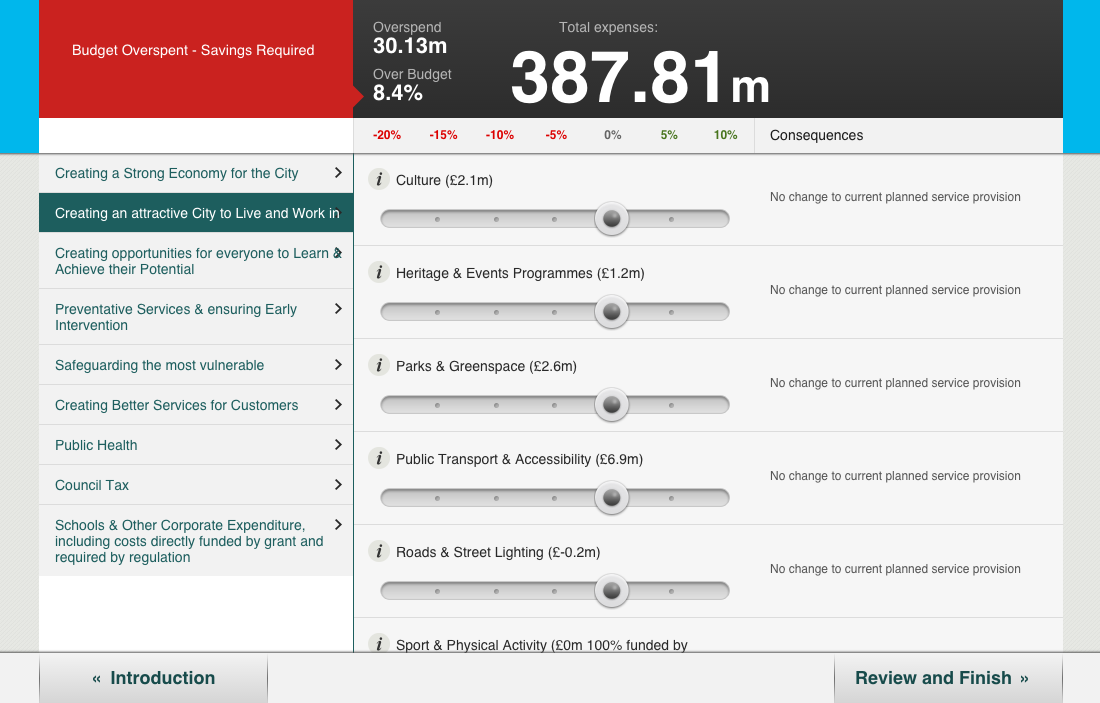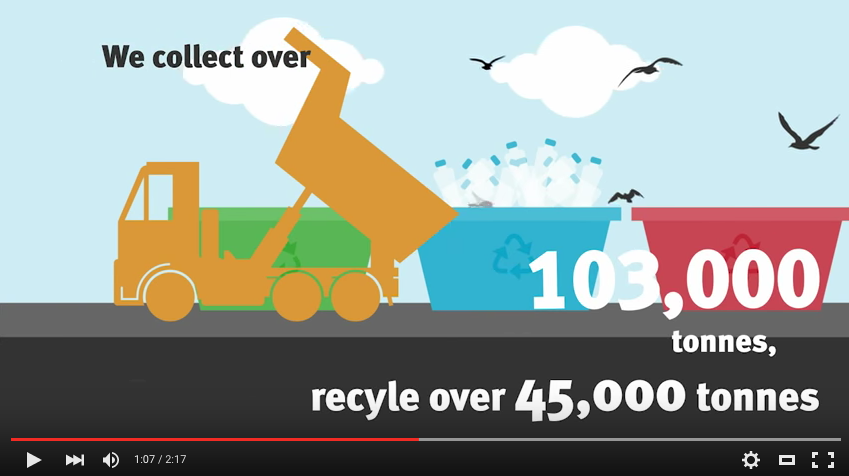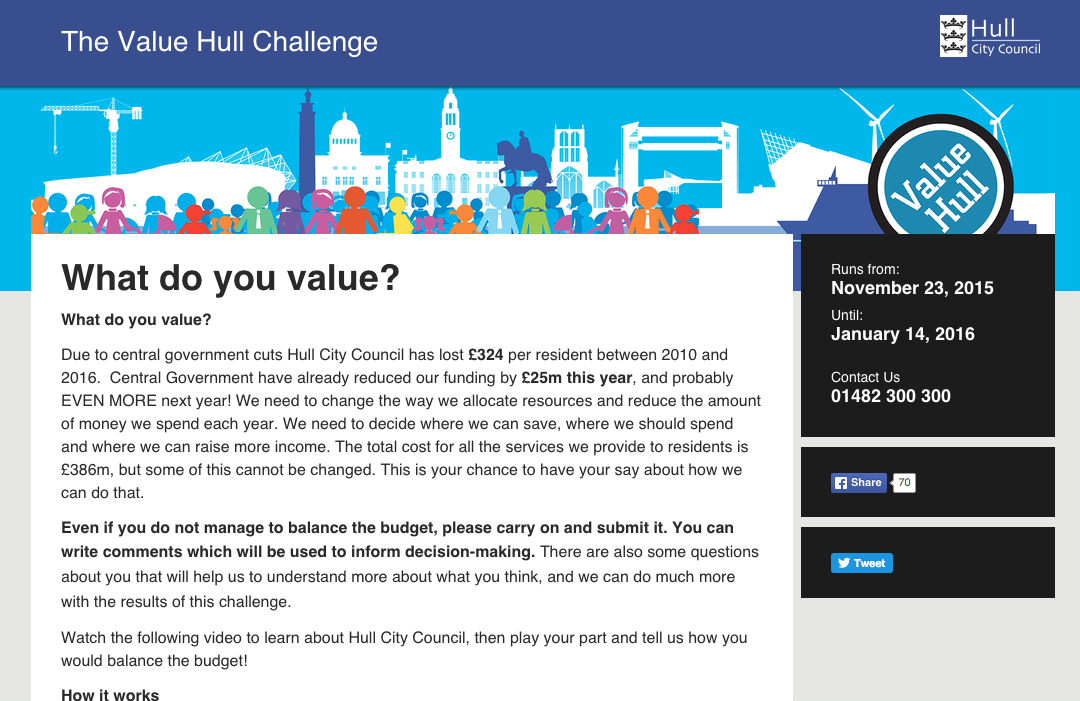We asked Hull City Council how they found using Simulator for their budget consultation activity. Here’s what Sarah Tonks, Customer Insight and Engagement Officer, told us:
Hull City Council used Simulator as part of our public budget consultation activity in 2014/15, and we’re using it again for 2015/16.
We wanted to achieve two things by using the Simulator:
- To build on previous research and consultation undertaken with residents, to understand what services they valued.
We have asked residents their opinion on different services a number of times: how they rate them and which they think are the most important, both for themselves and for the city as whole. - To give residents the chance to understand the challenge of balancing a budget in the face of such deep cuts year on year.
The decisions facing the Council are really difficult, and we hope that Simulator gives the people of Hull an understanding of why some services need to take a back seat to others.
When it comes to consulting on issues as complex as this, it is always a challenge to present information in an engaging way that everyone can understand. It needs sufficient detail so that each element of the decision-making is informed and, at the same time, not so detailed that no-one will read it. As one resident put it:
“I appreciate the opportunity for consultation and this tool is intuitive and easy to use.”
Having undertaken extensive research into the attitudes of our residents, Simulator was really useful as a way of checking (and in many cases validating) other findings. The ability for residents to see what has to be done in order to save services was really helpful, as was being able to detail the potential consequences of savings in specific services.
It gave residents a much better picture of what it means to work with reducing budgets, and helped make it real for them.
Using Simulator gave residents an insight to the extent of the work that the local authority does and how their own lives are affected by the council. Overall, we found that those who visited the site fell into two broad categories:
- those who couldn’t make the budget balance, no matter how hard they tried
- those who balanced the budget but only by cutting services that they valued but felt were of less importance than others
The former tended to comment on how hard it was, and how impossible they found it to make some of those decisions.
The latter also commented on the difficulty of the decisions that had to be made, and in the main, felt that we should increase our income where we could. Many comments suggested an increase in Council Tax charges, which came as a surprise.
A resident expressed the view of many:
“I can’t do this. I don’t know where you might make economies from the information given. My heart aches for the decisions the government is forcing you to make.”
A number of comments simply wished us luck.
We promoted the consultation using Simulator through a variety of channels, as part of the “Value Hull” campaign, asking residents to take the “Budget challenge”. Hull City Council has a resident panel, the ‘People’s Panel’, which consists of around 3,500 local people whom we regularly contact for research and consultation. All members of the Panel received information about the Budget Challenge.
The Value Hull campaign used street advertising, local newspaper and radio items, as well as events with members of our local voluntary and community sector. Through our network of public access PCs at customer service centres and libraries, we used pop-ups to encourage residents to complete the challenge. As part of this campaign, we also created a video detailing the work the Council does, which we ran alongside the Simulator. We ran banners on our website, with links through to the Simulator, and also made extensive use of social media.
We had about 4,000 visitors to the site, and about 10% of those managed to complete the exercise and submit their budget. We got some rather shocked comments from visitors who had not appreciated the extent of cuts, or the extent of council services and how they would be affected.
Having already completed other research and consultation to help us make these decisions, this exercise helped to confirm that our direction of travel was the one that our residents felt was right. There were a number of key themes that emerged, which will be used to inform further decision-making. One we have already mentioned is the suggestion that we increase Council Tax charges. Others that we had not expected included:
- residents taking more responsibility, for themselves and for their city, particularly around things like littering and waste recycling
- the acceptance of “must-have services” versus “nice-to-have services” –
some proposed cuts, such as to library or leisure services, have often met with quite vocal opposition. However, using the Simulator showed residents some of the stark choices involved. This increased appreciation allowed residents to understand that, really, there was often no choice.
Hull City Council is generally good at reaching a demographically representative sample, and this exercise was no exception. In Hull, a reasonably high proportion of residents do not access the internet regularly and of course, Simulator is an online tool. We overcame this through the provision of free internet access to residents across the city, via libraries and customer service centres, so we were able to enable those residents to participate.
The analytics tools gave us some real insight into the types of devices that local people use when they access the internet. We have used some of this information to look at ways that we can redesign some of our ongoing research and consultation activity to work with a variety of devices, so it has been really useful.
We found Delib really easy to work with. They are great fun, and really laid back and they can’t do enough to help. They are clearly very good at their job, and each person we dealt with knew their onions, undoubtedly. They were able to answer our questions (of which we had many) and someone was always available to us when we needed it, especially in the stressful run up to our Simulator going live. We won’t hesitate to work with them again.
Hull City Council Chief Executive Matt Jukes said:
“The use of Delib’s Budget Simulator as a part of our budget setting engagement work has been extremely useful. It has helped us to engage and involve our residents in a very complex and difficult process. The comments that we got back from residents show that those who participated got a real insight into the decision-making process that touches so many people’s lives.”
On Delib’s part, it’s always great to hear of more Councils and citizens finding Simulator a valuable exercise. Any time it helps bridge the gap between decision-makers and people affected by those decisions, Simulator is doing what we made it for. Of course, Hull City Council are just one example among many public organisations facing challenging budget cuts and accordingly difficult spending decisions. We hope Simulator can at least help people to understand and be involved in these choices, even when they seem impossibly hard.
To find out more about Simulator and how it can work for you, you can book a free demo and we’ll walk you through it.
To see how other organisations are using it, check out the Simulator Aggregator.
More like this: Fostering understanding with Simulator in Edinburgh; How South East Water used Simulator to understand consumer priorities


